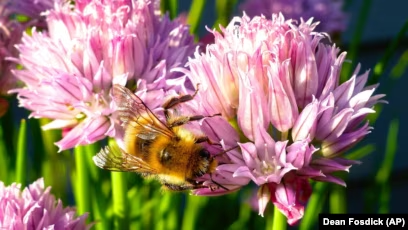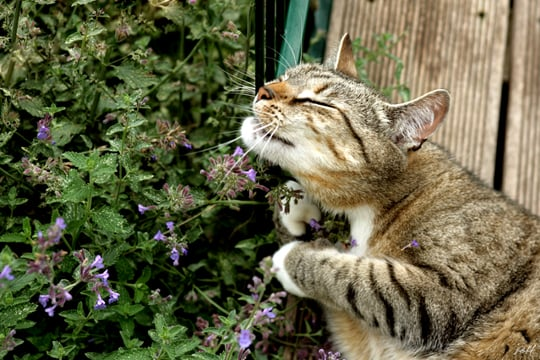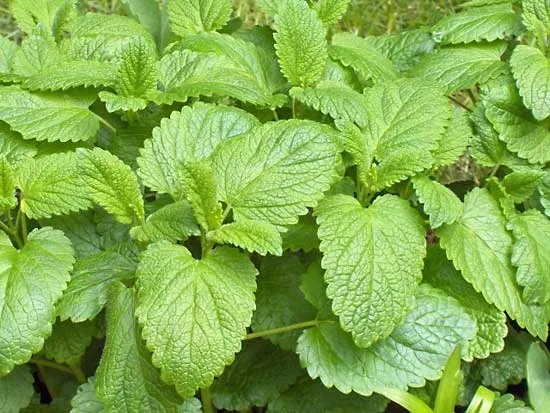Stress and anxiety can disrupt your day, but the solution might be closer than you think—right in your garden! By growing calming herbs like lemon balm, catnip, and tulsi basil, you can naturally ease tension and enhance your well-being. Known as nervine herbs, these plants interact with the nervous system, providing a mild relaxing effect that helps alleviate stress, all while adding delightful flavors and scents to your garden.
Benefits for Your Garden and Beyond
In addition to their calming properties, these herbs also benefit your garden. Pollinators such as bees are drawn to the flowers of catnip and mint, while the dense growth of lemon balm offers shelter to young spiders. These herbs can even serve as a natural insect repellent. Simply crush a handful of leaves and rub them on your skin for temporary protection while working outside.

Tulsi Basil: A Sacred Stress Reliever
Tulsi basil (Ocimum tenuiflorum), also known as holy basil, is revered in Ayurvedic medicine for its ability to reduce stress and support emotional well-being. Studies have confirmed its role in managing anxiety and depression. With its unique citrusy, musky fragrance, tulsi basil not only soothes the mind but also fills your kitchen with an aromatic boost when added to tea.
This herb is easy to grow from seed, thriving in warm weather. Tulsi basil is resilient, facing few threats from insects or animals, and its leaves and flowers are perfect for drying and using throughout the year. If you’re looking to grow a calming herb, tulsi basil should be on your list.
Catnip: More Than Just a Cat’s Delight
While catnip (Nepeta cataria) is famous for its euphoric effects on cats, it also offers calming benefits to humans. Catnip is often used in herbal teas to ease tension and promote relaxation, though it works more as a mood enhancer than a sedative. This herb is a short-lived perennial that self-seeds, meaning it can easily spread in your garden, and its pink flowers attract bees.
Catnip thrives early in the spring, offering abundant foliage in early summer that can be harvested for drying. Cutting back the plants encourages regrowth and more blooms, so you can enjoy its benefits throughout the growing season.

Lemon Balm: A Timeless Soothing Herb
Lemon balm (Melissa officinalis), a member of the mint family, has been used for centuries as a calming herb. It’s incredibly easy to grow and provides a robust lemon fragrance that can deter insects. While its citrus flavor diminishes slightly in tea, cold-steeping the leaves to make infused water will bring out the full aroma.
This perennial herb grows vigorously, and its calming effects make it a great addition to any garden. Lemon balm is especially useful as a natural insect repellent when you crush its leaves and apply them to your skin.

Chamomile: Soothing the Body and Mind
Chamomile (Matricaria chamomilla) has long been known for its soothing properties, especially for the digestive system. By calming your stomach, chamomile helps relax the body and promote restful sleep. This hardy annual is easy to grow and adds delicate, fern-like foliage to the garden. The sweet, apple-like scent of its flowers can be enjoyed when crushed, and the blossoms dry quickly for later use in tea or tinctures.
The Power of Mint and Lavender
Many calming herbs, including mints, can be combined with other nervine herbs for even greater relaxation effects. Mints not only have an uplifting and refreshing scent, but they can also help change irritability into calmness with just a few whiffs. Additionally, lavender, which contains linalool compounds, has been shown to reduce anxiety and promote relaxation, making it an excellent complement to your garden’s calming collection.
The Joy of Harvesting Calming Herbs
As a gardener, the most rewarding part of growing calming herbs is harvesting them fresh and experiencing the aromatic burst as you work. This sensory experience, whether you’re starting or ending your day, is a primal pleasure that brings joy and tranquility.
Incorporating these herbs into your garden doesn’t just help with stress relief, but it creates a harmonious environment that supports both your well-being and the health of your garden. Happy gardening and calming!
